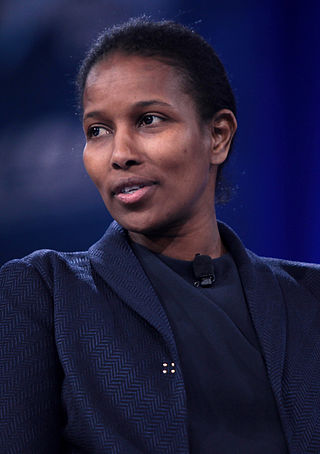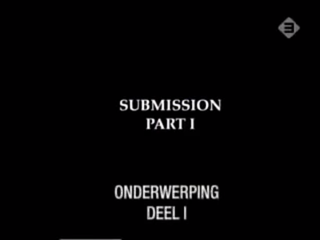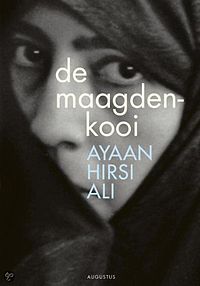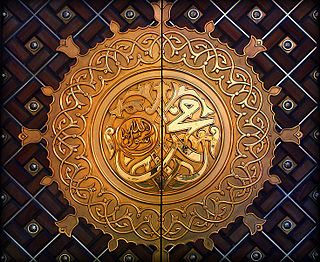
Abū Bakr ʿAbd Allāh ibn ʿAbī Quḥāfa was the senior companion and was, through his daughter Aisha, a father-in-law of the Islamic prophet Muhammad, as well as the first Caliph of the Rashidun Caliphate. He is known with the honorific title al-Siddiq by Sunni Muslims.

Muhammad was an Arab religious, social, and political leader and the founder of Islam. According to Islamic doctrine, he was a prophet divinely inspired to preach and confirm the monotheistic teachings of Adam, Abraham, Moses, Jesus, and other prophets. He is believed to be the Seal of the Prophets within Islam, with the Quran as well as his teachings and practices forming the basis for Islamic religious belief.

Medina, officially Al-Madinah al-Munawwarah and also commonly simplified as Madīnah or Madinah, is the capital of Medina Province in the Hejaz region of western Saudi Arabia. One of the most sacred cities in Islam, the estimated population as of 2020 is 1,488,782, making it the fifth-most populous city in the country. Located at the core of the Medina Province in the western reaches of the country, the city is distributed over 589 km2 (227 sq mi), of which 293 km2 (113 sq mi) constitutes the city's urban area, while the rest is occupied by the Hejaz Mountains, empty valleys, agricultural spaces and older dormant volcanoes.
The Hijrah or Hijra was the journey the Islamic prophet Muhammad and his followers took from Mecca to Medina. The year in which the Hijrah took place is also identified as the epoch of the Lunar Hijri and Solar Hijri calendars; its date equates to 16 July 622 in the Julian calendar. The Arabic word hijra means primarily "a severing of ties of kinship or association." It has been also transliterated as Hegira in medieval Latin, a term still in occasional use in English.
A heretic is a person who commits heresy.

Ayaan Hirsi Ali is a Somali-born Dutch-American activist and former politician. She is a critic of Islam and advocate for the rights and self-determination of Muslim women, opposing forced marriage, honour killing, child marriage, and female genital mutilation.

Theodoor van Gogh was a Dutch film director. He directed Submission: Part 1, a short film written by Somali writer and politician Ayaan Hirsi Ali, which criticised the treatment of women in Islam in strong terms. On 2 November 2004, he was murdered by Mohammed Bouyeri, a Dutch-Moroccan Islamist who objected to the film's message. The last film Van Gogh had completed before his murder, 06/05, was a fictional exploration of the assassination of Dutch politician Pim Fortuyn. It was released posthumously in December 2004, a month after Van Gogh's death, and two years after Fortuyn's death.

Submission is a 2004 English-language Dutch short drama film produced and directed by Theo van Gogh, and written by Ayaan Hirsi Ali ; it was shown on NPO 3, a Dutch public broadcasting network, on 29 August 2004. The film's title is one of the possible translations of the Arabic word "Islam". A Muslim extremist reacted to the film by assassinating Van Gogh.
Al-Mujādilah is the 58th chapter (sūrah) of the Qur'an with 22 verses (ayat). Revealed in Medina, the chapter first addresses the legality of pre-Islamic method of divorce called zihar. The name "she who disputes" refers to the woman who petitioned Muhammad about the unjustness of this method, and the chapter's first verses outlaw it and prescribe how to deal with past cases of zihar. The chapter also discusses public assemblies and prescribes manners associated with it. The chapter ends by contrasting what it calls "the confederates of God" and "the confederates of Satan", and promising rewards for the former.

The Caged Virgin: A Muslim Woman's Cry for Reason, also published as The Caged Virgin: An Emancipation Proclamation for Women and Islam, is a 2004 book by the former Dutch parliamentarian Ayaan Hirsi Ali. The Caged Virgin was first published in English in 2006.

Muḥammad bin ʿAbd Allāh bin ʿAbd al-Muṭṭalib bin Hāshim is believed to be the seal of the messengers and prophets of God in all of the main branches of Islam. Muslims believe that the Quran, the central religious text of Islam, was revealed to Muhammad by God, and that Muhammad was sent to restore Islam, which they believe did not originate with Muhammad but is the true unaltered original monotheistic faith of Adam, Abraham, Moses, Jesus, and other prophets. The religious, social, and political tenets that Muhammad established with the Quran became the foundation of Islam and the Muslim world.

The Islamic prophet Muhammad came to the city of Medina following the migration of his followers in what is known as the Hijrah in 622. He had been invited to Medina by city leaders to adjudicate disputes between clans from which the city suffered. He left Medina to return to and conquer Mecca in December 629.
Muhammad, the final Islamic prophet, was born and lived in Mecca for the first 53 years of his life until the Hijra. This period of his life is characterized by his proclamation of prophethood. Muhammad's father, Abdullah ibn Abd al-Muttalib, died before he was born. His mother would raise him until he was six years old, before her death around 577 CE at Abwa'. Subsequently raised by his grandfather, Abd al-Muttalib, and then his uncle, Abu Talib ibn ‘Abd al-Muttalib, Muhammad's early career involved being a shepherd and merchant. Muhammad married Khadija bint Khuwaylid after a successful trading endeavour in Syria. After the death of Khadija and Abu Talib in the Year of Sorrow, Muhammad married Sawda bint Zam'a and Aisha.

The holiest sites in Islam are predominantly located in the Arabian Peninsula and the Levant. While the significance of most places typically varies depending on the Islamic sect, there is a consensus across all mainstream branches of the religion that affirms three cities as having the highest degree of holiness, in descending order: Mecca, Medina, and Jerusalem. Mecca's Al-Masjid al-Haram, Al-Masjid an-Nabawi in Medina, and Al-Masjid al-Aqsa in Jerusalem are all revered by Muslims as sites of great importance.

Infidel is a 2006 autobiography of Ayaan Hirsi Ali, a Somali-Dutch activist and politician. Hirsi Ali has attracted controversy and death threats were made against Ali in the early 2000s over the publication of the book.
This is a bibliography of literature treating the topic of criticism of Islam, sorted by source publication and the author's last name.
Laylat al-mabit refers to the night in 622 CE in which the Islamic prophet Muhammad fled Mecca for Yathrib, apparently to foil an assassination plan. His escape from Mecca followed the exodus of his persecuted followers to the safe haven of Yathrib, a city that was later renamed Medina in his honor. Laylat al-mabit is often associated in Islamic literature with the reports that Muhammad's cousin Ali ibn Abi Talib risked his life to facilitate Muhammad's safe escape from Mecca.

Islam and the Future of Tolerance: A Dialogue is a 2015 book collaboration between American author Sam Harris and British activist Maajid Nawaz. The book has been subsequently adapted into a documentary film of the same title.

De zoontjesfabriek. Over vrouwen, islam en integratie is the title of Ayaan Hirsi Ali's first book, which was published in Dutch in December 2002. It is a collection of all articles that Hirsi Ali had published up till then, and an interview with Dutch feminist author Colet van der Ven.













